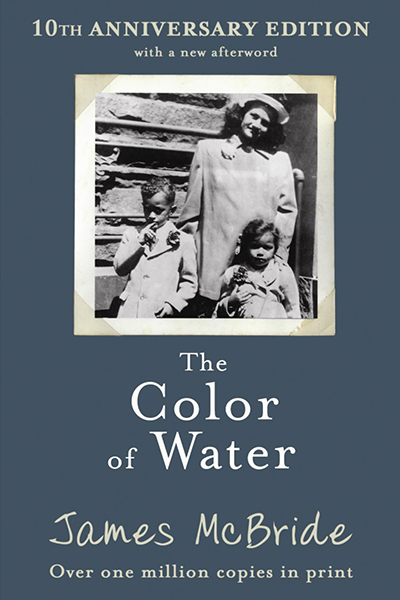Books
The Color of Water
The Color Of Water
This fascinating, superbly written memoir was a New York Times bestseller for two years. To date it has sold sold more than 2.1 million copies worldwide and been translated into more than 16 languages. It tells the story of James McBride and his white, Jewish mother Ruth. Ruth was born in Poland and raised in Suffolk, Va, the daughter of an itinerant rabbi and a loving, disabled mother who spoke no English. At 17, Ruth fled the South, landed in Harlem, married a black man in 1941, founded a church, was twice widowed and raised 12 children in New York City. Despite hardship, poverty, and suffering, Ruth sent all 12 of her children to college.
Lavishly praised by critics, embraced by millions of readers, this tribute to a remarkable woman helped set the standard for modern day memoir writing. It is considered an American classic and is required reading in high schools and colleges across America. It is a perennial favorite of book clubs and community-wide reading events, including New York City and Philadelphia. IBut most importantly, it is an eloquent, touching exploration of what family really means.
James was working as a tenor sax sideman with jazz legend Jimmy Scott when he penned this book, which was written in hotel rooms, vans, airports, libraries and on buses. Previously he served for eight years as a journalist. He was a feature writer in the Style Section at The Washington Post when, at age 30, he quit the Post, moved to New to play jazz, and subsequently starved. He slept on mattresses played in blues bands, taught ESL to Polish refugees, and played “every kind of gig you can name — weddings, bars, dances, clubs,” he says. While struggling through self-described “unsettled angst,” James realized that the key to finding peace within himself was not in his horn, but in the story of the most interesting person he’d ever known — and the person he loved the most — his own mother.
He set about interviewing Ruth McBride Jordan and searching out her mysterious past, a process that took 14 years and resulted in a book that is regarded as a landmark work. Says McBride of The Color of Water: “If I had known so many people were going to read that book, I would’ve written a better book.”
Reviews
“An eloquent narrative in which a young black man searches for his roots—against the wishes of his mother. McBride, a professional saxophonist and former staff writer for the Boston Globe and the Washington Post, grew up with 11 siblings in an all-black Brooklyn, New York, housing project. As a child, he became aware that his mother was different from others around him: She was white, and she kept secrets. When asked where she was from, McBride recalls, she would say something like “God made me”; when asked about her ethnicity, she would say, “ `I’m light-skinned,’ and change the subject.” No amount of prodding could get her to say much more, and McBride was left to explore his mother’s past without much help from his principal subject. What he learned occupies the pages of this vivid, affecting memoir: the story of a woman whose parents fled the anti-Jewish pogroms of Central Europe for the American South, there to be faced with new prejudices and develop a few of their own; a woman whose father sexually abused her for years and who “would run down the back roads where the black folks lived” to escape him; a woman who moved to New York, married a black minister, and raised eight children, then remarried on his death and raised four more. “My parents were nonmaterialistic. They believed that money without knowledge was worthless, that education tempered with religion was the way to climb out of poverty in America, and over the years they were proven right,” McBride writes. The catalogue of his siblings with which he closes his book bears him out: Most have gone on to be doctors, educators, and professionals, with rÇsumÇs of unbroken success. McBride’s mother should take much pleasure in this loving if sometimes uncomfortable memoir, which embodies family values of the best kind. Other readers will take pleasure in it as well.”
Assistant
Margaret S Saunders
maggiesaunders820@gmail.com
Publicity To Book
Ashley Garland
AGarland@penguinrandomhouse.com
To write to James McBride
James McBride
JamesMcBride@jamesmcbride.com

